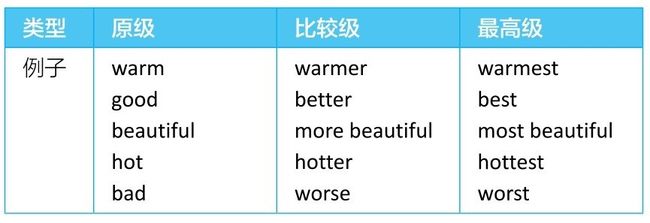今天,我们要分享的主要内容是形容词的分级。大多数形容词是可以分级的,有比较级与最高级形式,如:
但是,有一些形容词则不能分级,即没有比较级和最高级。它包括无分级形容词和极限形容词两种。如:
daily、dead、medical、unique(无分级形容词)
excellent、perfect、favourite(极限形容词)
Swimming is my favourite sport.游泳是我最喜爱的一项运动。
1 形容词比较级和最高级的构成
形容词的比较级和最高级的一般构成方法是:①单音节形容词及少数双音节形容词直接在后面加-er和-est构成比较级和最高级,如:cold——colder——coldest,cool——cooler——coolest,great——greater——greatest,hard——harder——hardest
②在以重读闭音节结尾的形容词中,当结尾是一个元音字母加一个辅音字母时,应双写其结尾的辅音字母后再加-er和-est,如:fat——fatter——fattest,sad——sadder——saddest,thin——thinner——thinnest,wet——wetter——wettest
③有些形容词是以字母-e结尾,它们的比较级和最高级可在其后直接加-r或-st,如:fine——finer——finest,large——larger——largest,safe——safer——safest
④有些形容词是以字母-y结尾,而且在-y的前面有一个辅音字母,这种形容词变为比较级和最高级时应首先把y变为i,然后再加-er和-est,如:tidy——tidier——tidiest.这类词还包括busy,dirty,dry,easy,empty,funny,heavy,ready,sleepy等。
有少数形容词的结尾字母-y前面是一个元音字母,这种情况的比较级和最高级只在该形容词后直接加-er和-est,如:gay,grey,fey等。
⑤三个和三个音节以上的形容词变比较级、最高级时通常在词前加more和most,如:beautiful、difficult、wonderful等。
2 形容词比较级和最高级的用法
①当我们把一个人或事物与另一个人或事物进行比较时,用比较级,如:
Jenny is taller than Judy.(单项之间比较)
Jenny is taller than other girls.(单项与一组之间比较)
The girls in Class Two are taller than the girls in Class Five.(两组之间比较)
②将某一范围内的一个人或物和其他一个以上的人或物作比较时,用最高级。短语或句子中的形容词最高级前要用定冠词the,副词则不必,如:
Who is the tallest,Jack,Jenny or Judy?
Judy is the tallest.
First Class is the most expensive way to travel.坐头等舱旅行是最贵的。
③我们经常用“more and more”句型来表示“越来越……”的意思,如:
Judy is becoming more and more beautiful.
It's getting colder and colder.
④在表示“越……就越……”时,用“the more……the more……”句型,如:
The more money you make,the more you spend.
The more exoensive petrol becomes,the less people drive.汽油越贵,开车的人就越少。
⑤可修饰形容词比较级的词
通常只有少数表示程度的词才能修饰形容词的比较级,如:a bit,a little,a few, a great deal,much,a lot,lots,far,by far,even,still,hardly any,rather,no和somewhat.
It's much/far/a lot colder today than it was yesterday.
Houses are much/far/a lot more expensive these days.
⑥可修饰形容词最高级的词主要有almost,altogether,far,by far,much,nearly,quite,the very等,如:
This is quite/by far the most expensive bicycle in the shop.
This is by far the worst stretch of motor-way in the country.这是这个国家最糟糕的一段公路。
I want to give my children the very best education I can afford.
3 形容词原级的常用句型
当使用“as+形容词原级+as”的句型时,表示前后两者具有同等程度;其否定形式一般为“not as/so+形容词原级+as”,一般可理解为“前者不如后者”。如:
Jenny is as tall as Jack.
Jenny is not as/so intelligent as we think.
Mike locked the door as quickly as he can,
有关形容词比较级、最高级和原级用法的知识就说到这里啦,欢迎感兴趣的朋友一起交流。


